KU Children's Services: Comprehensive Report on Programs and Services
VerifiedAdded on 2021/01/04
|7
|3882
|136
Report
AI Summary
This report provides a comprehensive overview of KU Children's Services, a not-for-profit organization dedicated to early childhood education. The report details the organization's commitment to providing high-quality services through play-based learning programs designed to nurture children's skills and prepare them for school. It highlights the importance of social skills, interactions, and various learning approaches, including intentional teaching and fostering a sense of well-being. The report also includes information on fees, payment options, and staff-to-child ratios, as well as the organization's operational hours and age groups served. The report emphasizes KU's long-standing legacy and commitment to sustainability, ensuring reinvestment in staff and services for the benefit of children. The report also highlights the importance of play-based learning in developing children's physical abilities and building a strong foundation for life-long learning.
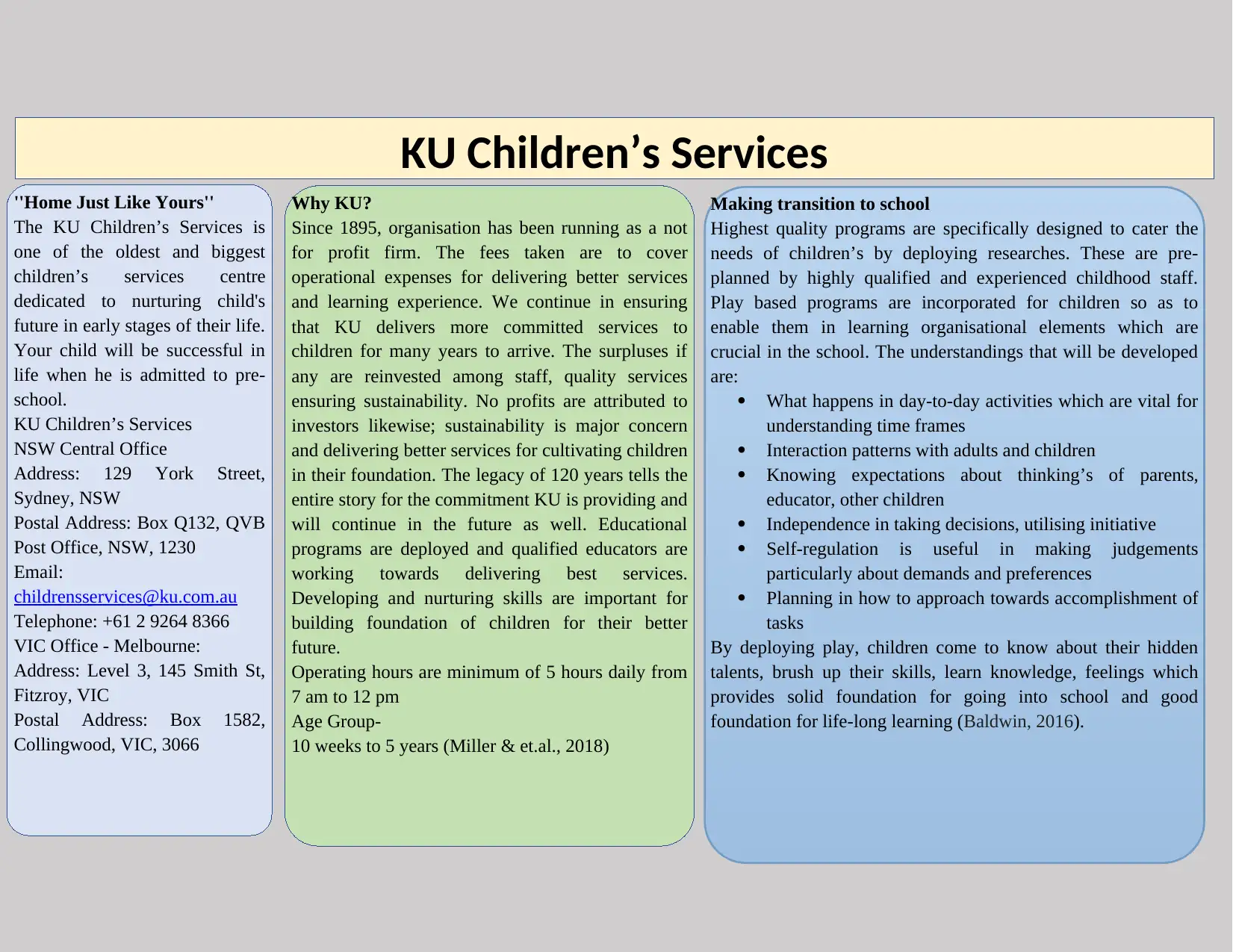
KU Children’s Services
''Home Just Like Yours''
The KU Children’s Services is
one of the oldest and biggest
children’s services centre
dedicated to nurturing child's
future in early stages of their life.
Your child will be successful in
life when he is admitted to pre-
school.
KU Children’s Services
NSW Central Office
Address: 129 York Street,
Sydney, NSW
Postal Address: Box Q132, QVB
Post Office, NSW, 1230
Email:
childrensservices@ku.com.au
Telephone: +61 2 9264 8366
VIC Office - Melbourne:
Address: Level 3, 145 Smith St,
Fitzroy, VIC
Postal Address: Box 1582,
Collingwood, VIC, 3066
Why KU?
Since 1895, organisation has been running as a not
for profit firm. The fees taken are to cover
operational expenses for delivering better services
and learning experience. We continue in ensuring
that KU delivers more committed services to
children for many years to arrive. The surpluses if
any are reinvested among staff, quality services
ensuring sustainability. No profits are attributed to
investors likewise; sustainability is major concern
and delivering better services for cultivating children
in their foundation. The legacy of 120 years tells the
entire story for the commitment KU is providing and
will continue in the future as well. Educational
programs are deployed and qualified educators are
working towards delivering best services.
Developing and nurturing skills are important for
building foundation of children for their better
future.
Operating hours are minimum of 5 hours daily from
7 am to 12 pm
Age Group-
10 weeks to 5 years (Miller & et.al., 2018)
Making transition to school
Highest quality programs are specifically designed to cater the
needs of children’s by deploying researches. These are pre-
planned by highly qualified and experienced childhood staff.
Play based programs are incorporated for children so as to
enable them in learning organisational elements which are
crucial in the school. The understandings that will be developed
are:
What happens in day-to-day activities which are vital for
understanding time frames
Interaction patterns with adults and children
Knowing expectations about thinking’s of parents,
educator, other children
Independence in taking decisions, utilising initiative
Self-regulation is useful in making judgements
particularly about demands and preferences
Planning in how to approach towards accomplishment of
tasks
By deploying play, children come to know about their hidden
talents, brush up their skills, learn knowledge, feelings which
provides solid foundation for going into school and good
foundation for life-long learning (Baldwin, 2016).
''Home Just Like Yours''
The KU Children’s Services is
one of the oldest and biggest
children’s services centre
dedicated to nurturing child's
future in early stages of their life.
Your child will be successful in
life when he is admitted to pre-
school.
KU Children’s Services
NSW Central Office
Address: 129 York Street,
Sydney, NSW
Postal Address: Box Q132, QVB
Post Office, NSW, 1230
Email:
childrensservices@ku.com.au
Telephone: +61 2 9264 8366
VIC Office - Melbourne:
Address: Level 3, 145 Smith St,
Fitzroy, VIC
Postal Address: Box 1582,
Collingwood, VIC, 3066
Why KU?
Since 1895, organisation has been running as a not
for profit firm. The fees taken are to cover
operational expenses for delivering better services
and learning experience. We continue in ensuring
that KU delivers more committed services to
children for many years to arrive. The surpluses if
any are reinvested among staff, quality services
ensuring sustainability. No profits are attributed to
investors likewise; sustainability is major concern
and delivering better services for cultivating children
in their foundation. The legacy of 120 years tells the
entire story for the commitment KU is providing and
will continue in the future as well. Educational
programs are deployed and qualified educators are
working towards delivering best services.
Developing and nurturing skills are important for
building foundation of children for their better
future.
Operating hours are minimum of 5 hours daily from
7 am to 12 pm
Age Group-
10 weeks to 5 years (Miller & et.al., 2018)
Making transition to school
Highest quality programs are specifically designed to cater the
needs of children’s by deploying researches. These are pre-
planned by highly qualified and experienced childhood staff.
Play based programs are incorporated for children so as to
enable them in learning organisational elements which are
crucial in the school. The understandings that will be developed
are:
What happens in day-to-day activities which are vital for
understanding time frames
Interaction patterns with adults and children
Knowing expectations about thinking’s of parents,
educator, other children
Independence in taking decisions, utilising initiative
Self-regulation is useful in making judgements
particularly about demands and preferences
Planning in how to approach towards accomplishment of
tasks
By deploying play, children come to know about their hidden
talents, brush up their skills, learn knowledge, feelings which
provides solid foundation for going into school and good
foundation for life-long learning (Baldwin, 2016).
Paraphrase This Document
Need a fresh take? Get an instant paraphrase of this document with our AI Paraphraser
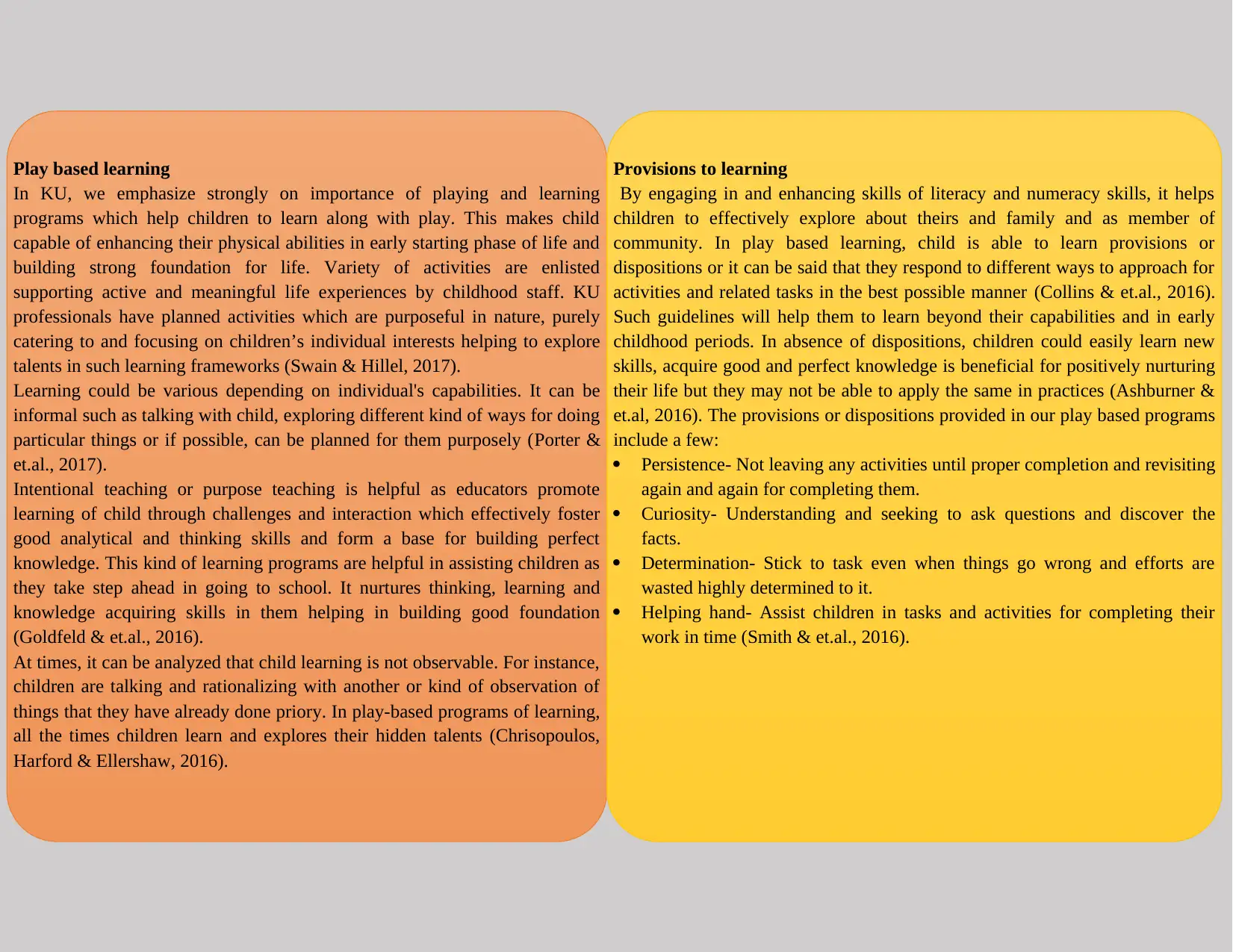
Play based learning
In KU, we emphasize strongly on importance of playing and learning
programs which help children to learn along with play. This makes child
capable of enhancing their physical abilities in early starting phase of life and
building strong foundation for life. Variety of activities are enlisted
supporting active and meaningful life experiences by childhood staff. KU
professionals have planned activities which are purposeful in nature, purely
catering to and focusing on children’s individual interests helping to explore
talents in such learning frameworks (Swain & Hillel, 2017).
Learning could be various depending on individual's capabilities. It can be
informal such as talking with child, exploring different kind of ways for doing
particular things or if possible, can be planned for them purposely (Porter &
et.al., 2017).
Intentional teaching or purpose teaching is helpful as educators promote
learning of child through challenges and interaction which effectively foster
good analytical and thinking skills and form a base for building perfect
knowledge. This kind of learning programs are helpful in assisting children as
they take step ahead in going to school. It nurtures thinking, learning and
knowledge acquiring skills in them helping in building good foundation
(Goldfeld & et.al., 2016).
At times, it can be analyzed that child learning is not observable. For instance,
children are talking and rationalizing with another or kind of observation of
things that they have already done priory. In play-based programs of learning,
all the times children learn and explores their hidden talents (Chrisopoulos,
Harford & Ellershaw, 2016).
Provisions to learning
By engaging in and enhancing skills of literacy and numeracy skills, it helps
children to effectively explore about theirs and family and as member of
community. In play based learning, child is able to learn provisions or
dispositions or it can be said that they respond to different ways to approach for
activities and related tasks in the best possible manner (Collins & et.al., 2016).
Such guidelines will help them to learn beyond their capabilities and in early
childhood periods. In absence of dispositions, children could easily learn new
skills, acquire good and perfect knowledge is beneficial for positively nurturing
their life but they may not be able to apply the same in practices (Ashburner &
et.al, 2016). The provisions or dispositions provided in our play based programs
include a few:
Persistence- Not leaving any activities until proper completion and revisiting
again and again for completing them.
Curiosity- Understanding and seeking to ask questions and discover the
facts.
Determination- Stick to task even when things go wrong and efforts are
wasted highly determined to it.
Helping hand- Assist children in tasks and activities for completing their
work in time (Smith & et.al., 2016).
In KU, we emphasize strongly on importance of playing and learning
programs which help children to learn along with play. This makes child
capable of enhancing their physical abilities in early starting phase of life and
building strong foundation for life. Variety of activities are enlisted
supporting active and meaningful life experiences by childhood staff. KU
professionals have planned activities which are purposeful in nature, purely
catering to and focusing on children’s individual interests helping to explore
talents in such learning frameworks (Swain & Hillel, 2017).
Learning could be various depending on individual's capabilities. It can be
informal such as talking with child, exploring different kind of ways for doing
particular things or if possible, can be planned for them purposely (Porter &
et.al., 2017).
Intentional teaching or purpose teaching is helpful as educators promote
learning of child through challenges and interaction which effectively foster
good analytical and thinking skills and form a base for building perfect
knowledge. This kind of learning programs are helpful in assisting children as
they take step ahead in going to school. It nurtures thinking, learning and
knowledge acquiring skills in them helping in building good foundation
(Goldfeld & et.al., 2016).
At times, it can be analyzed that child learning is not observable. For instance,
children are talking and rationalizing with another or kind of observation of
things that they have already done priory. In play-based programs of learning,
all the times children learn and explores their hidden talents (Chrisopoulos,
Harford & Ellershaw, 2016).
Provisions to learning
By engaging in and enhancing skills of literacy and numeracy skills, it helps
children to effectively explore about theirs and family and as member of
community. In play based learning, child is able to learn provisions or
dispositions or it can be said that they respond to different ways to approach for
activities and related tasks in the best possible manner (Collins & et.al., 2016).
Such guidelines will help them to learn beyond their capabilities and in early
childhood periods. In absence of dispositions, children could easily learn new
skills, acquire good and perfect knowledge is beneficial for positively nurturing
their life but they may not be able to apply the same in practices (Ashburner &
et.al, 2016). The provisions or dispositions provided in our play based programs
include a few:
Persistence- Not leaving any activities until proper completion and revisiting
again and again for completing them.
Curiosity- Understanding and seeking to ask questions and discover the
facts.
Determination- Stick to task even when things go wrong and efforts are
wasted highly determined to it.
Helping hand- Assist children in tasks and activities for completing their
work in time (Smith & et.al., 2016).
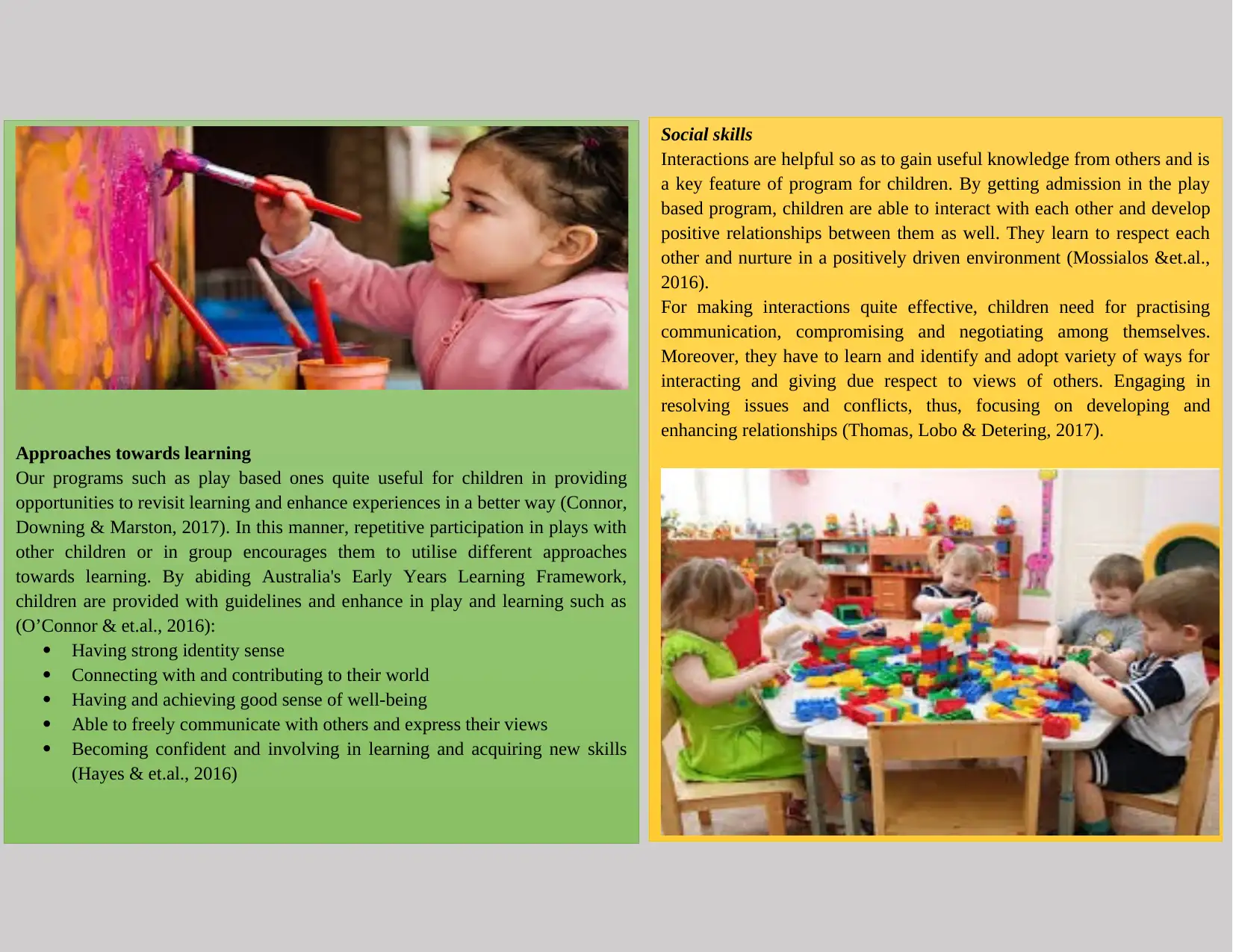
Approaches towards learning
Our programs such as play based ones quite useful for children in providing
opportunities to revisit learning and enhance experiences in a better way (Connor,
Downing & Marston, 2017). In this manner, repetitive participation in plays with
other children or in group encourages them to utilise different approaches
towards learning. By abiding Australia's Early Years Learning Framework,
children are provided with guidelines and enhance in play and learning such as
(O’Connor & et.al., 2016):
Having strong identity sense
Connecting with and contributing to their world
Having and achieving good sense of well-being
Able to freely communicate with others and express their views
Becoming confident and involving in learning and acquiring new skills
(Hayes & et.al., 2016)
Social skills
Interactions are helpful so as to gain useful knowledge from others and is
a key feature of program for children. By getting admission in the play
based program, children are able to interact with each other and develop
positive relationships between them as well. They learn to respect each
other and nurture in a positively driven environment (Mossialos &et.al.,
2016).
For making interactions quite effective, children need for practising
communication, compromising and negotiating among themselves.
Moreover, they have to learn and identify and adopt variety of ways for
interacting and giving due respect to views of others. Engaging in
resolving issues and conflicts, thus, focusing on developing and
enhancing relationships (Thomas, Lobo & Detering, 2017).
Our programs such as play based ones quite useful for children in providing
opportunities to revisit learning and enhance experiences in a better way (Connor,
Downing & Marston, 2017). In this manner, repetitive participation in plays with
other children or in group encourages them to utilise different approaches
towards learning. By abiding Australia's Early Years Learning Framework,
children are provided with guidelines and enhance in play and learning such as
(O’Connor & et.al., 2016):
Having strong identity sense
Connecting with and contributing to their world
Having and achieving good sense of well-being
Able to freely communicate with others and express their views
Becoming confident and involving in learning and acquiring new skills
(Hayes & et.al., 2016)
Social skills
Interactions are helpful so as to gain useful knowledge from others and is
a key feature of program for children. By getting admission in the play
based program, children are able to interact with each other and develop
positive relationships between them as well. They learn to respect each
other and nurture in a positively driven environment (Mossialos &et.al.,
2016).
For making interactions quite effective, children need for practising
communication, compromising and negotiating among themselves.
Moreover, they have to learn and identify and adopt variety of ways for
interacting and giving due respect to views of others. Engaging in
resolving issues and conflicts, thus, focusing on developing and
enhancing relationships (Thomas, Lobo & Detering, 2017).
⊘ This is a preview!⊘
Do you want full access?
Subscribe today to unlock all pages.

Trusted by 1+ million students worldwide
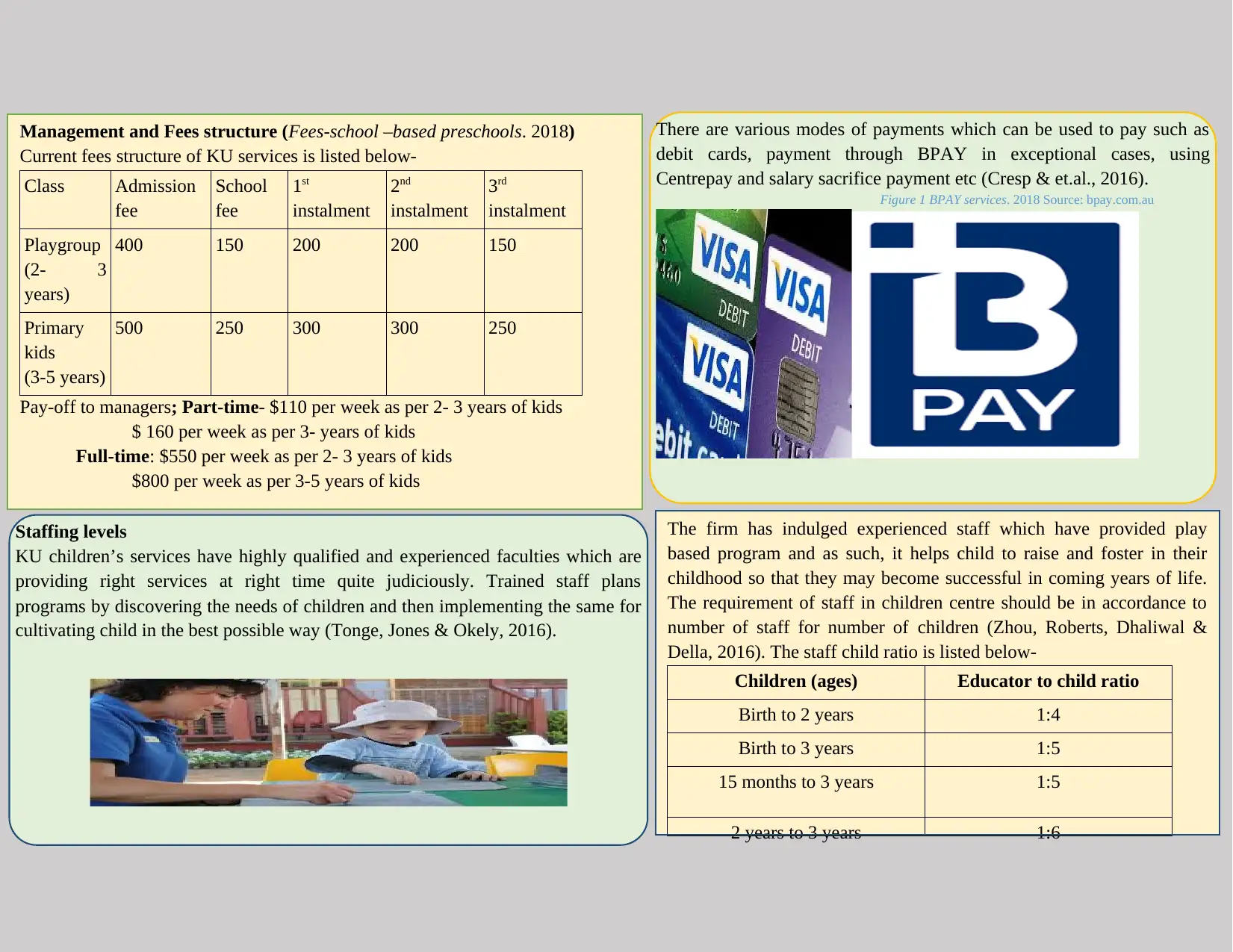
Management and Fees structure (Fees-school –based preschools. 2018)
Current fees structure of KU services is listed below-
Class Admission
fee
School
fee
1st
instalment
2nd
instalment
3rd
instalment
Playgroup
(2- 3
years)
400 150 200 200 150
Primary
kids
(3-5 years)
500 250 300 300 250
Pay-off to managers; Part-time- $110 per week as per 2- 3 years of kids
$ 160 per week as per 3- years of kids
Full-time: $550 per week as per 2- 3 years of kids
$800 per week as per 3-5 years of kids
There are various modes of payments which can be used to pay such as
debit cards, payment through BPAY in exceptional cases, using
Centrepay and salary sacrifice payment etc (Cresp & et.al., 2016).
Figure 1 BPAY services. 2018 Source: bpay.com.au
Staffing levels
KU children’s services have highly qualified and experienced faculties which are
providing right services at right time quite judiciously. Trained staff plans
programs by discovering the needs of children and then implementing the same for
cultivating child in the best possible way (Tonge, Jones & Okely, 2016).
The firm has indulged experienced staff which have provided play
based program and as such, it helps child to raise and foster in their
childhood so that they may become successful in coming years of life.
The requirement of staff in children centre should be in accordance to
number of staff for number of children (Zhou, Roberts, Dhaliwal &
Della, 2016). The staff child ratio is listed below-
Children (ages) Educator to child ratio
Birth to 2 years 1:4
Birth to 3 years 1:5
15 months to 3 years 1:5
2 years to 3 years 1:6
Current fees structure of KU services is listed below-
Class Admission
fee
School
fee
1st
instalment
2nd
instalment
3rd
instalment
Playgroup
(2- 3
years)
400 150 200 200 150
Primary
kids
(3-5 years)
500 250 300 300 250
Pay-off to managers; Part-time- $110 per week as per 2- 3 years of kids
$ 160 per week as per 3- years of kids
Full-time: $550 per week as per 2- 3 years of kids
$800 per week as per 3-5 years of kids
There are various modes of payments which can be used to pay such as
debit cards, payment through BPAY in exceptional cases, using
Centrepay and salary sacrifice payment etc (Cresp & et.al., 2016).
Figure 1 BPAY services. 2018 Source: bpay.com.au
Staffing levels
KU children’s services have highly qualified and experienced faculties which are
providing right services at right time quite judiciously. Trained staff plans
programs by discovering the needs of children and then implementing the same for
cultivating child in the best possible way (Tonge, Jones & Okely, 2016).
The firm has indulged experienced staff which have provided play
based program and as such, it helps child to raise and foster in their
childhood so that they may become successful in coming years of life.
The requirement of staff in children centre should be in accordance to
number of staff for number of children (Zhou, Roberts, Dhaliwal &
Della, 2016). The staff child ratio is listed below-
Children (ages) Educator to child ratio
Birth to 2 years 1:4
Birth to 3 years 1:5
15 months to 3 years 1:5
2 years to 3 years 1:6
Paraphrase This Document
Need a fresh take? Get an instant paraphrase of this document with our AI Paraphraser
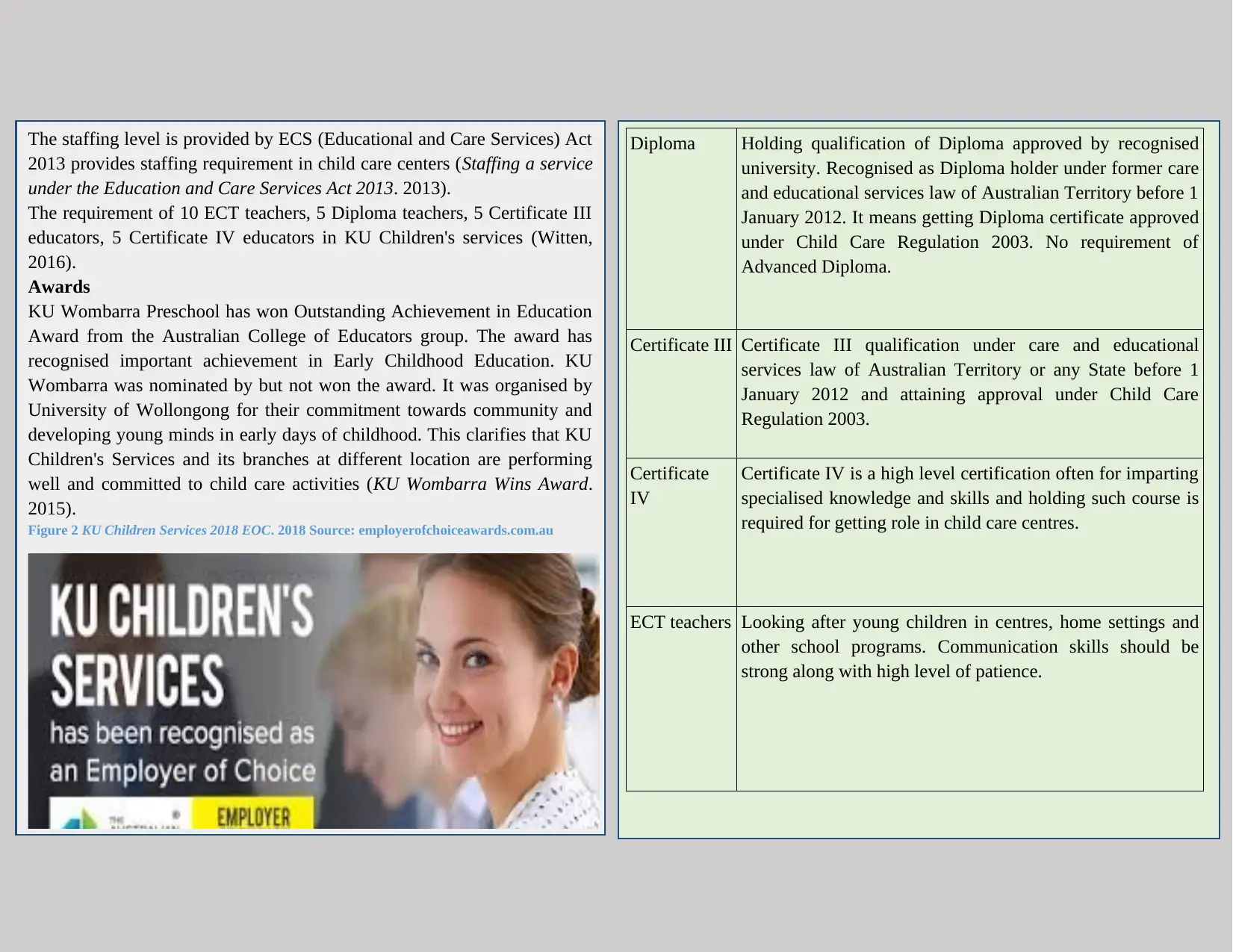
The staffing level is provided by ECS (Educational and Care Services) Act
2013 provides staffing requirement in child care centers (Staffing a service
under the Education and Care Services Act 2013. 2013).
The requirement of 10 ECT teachers, 5 Diploma teachers, 5 Certificate III
educators, 5 Certificate IV educators in KU Children's services (Witten,
2016).
Awards
KU Wombarra Preschool has won Outstanding Achievement in Education
Award from the Australian College of Educators group. The award has
recognised important achievement in Early Childhood Education. KU
Wombarra was nominated by but not won the award. It was organised by
University of Wollongong for their commitment towards community and
developing young minds in early days of childhood. This clarifies that KU
Children's Services and its branches at different location are performing
well and committed to child care activities (KU Wombarra Wins Award.
2015).
Figure 2 KU Children Services 2018 EOC. 2018 Source: employerofchoiceawards.com.au
Diploma Holding qualification of Diploma approved by recognised
university. Recognised as Diploma holder under former care
and educational services law of Australian Territory before 1
January 2012. It means getting Diploma certificate approved
under Child Care Regulation 2003. No requirement of
Advanced Diploma.
Certificate III Certificate III qualification under care and educational
services law of Australian Territory or any State before 1
January 2012 and attaining approval under Child Care
Regulation 2003.
Certificate
IV
Certificate IV is a high level certification often for imparting
specialised knowledge and skills and holding such course is
required for getting role in child care centres.
ECT teachers Looking after young children in centres, home settings and
other school programs. Communication skills should be
strong along with high level of patience.
2013 provides staffing requirement in child care centers (Staffing a service
under the Education and Care Services Act 2013. 2013).
The requirement of 10 ECT teachers, 5 Diploma teachers, 5 Certificate III
educators, 5 Certificate IV educators in KU Children's services (Witten,
2016).
Awards
KU Wombarra Preschool has won Outstanding Achievement in Education
Award from the Australian College of Educators group. The award has
recognised important achievement in Early Childhood Education. KU
Wombarra was nominated by but not won the award. It was organised by
University of Wollongong for their commitment towards community and
developing young minds in early days of childhood. This clarifies that KU
Children's Services and its branches at different location are performing
well and committed to child care activities (KU Wombarra Wins Award.
2015).
Figure 2 KU Children Services 2018 EOC. 2018 Source: employerofchoiceawards.com.au
Diploma Holding qualification of Diploma approved by recognised
university. Recognised as Diploma holder under former care
and educational services law of Australian Territory before 1
January 2012. It means getting Diploma certificate approved
under Child Care Regulation 2003. No requirement of
Advanced Diploma.
Certificate III Certificate III qualification under care and educational
services law of Australian Territory or any State before 1
January 2012 and attaining approval under Child Care
Regulation 2003.
Certificate
IV
Certificate IV is a high level certification often for imparting
specialised knowledge and skills and holding such course is
required for getting role in child care centres.
ECT teachers Looking after young children in centres, home settings and
other school programs. Communication skills should be
strong along with high level of patience.
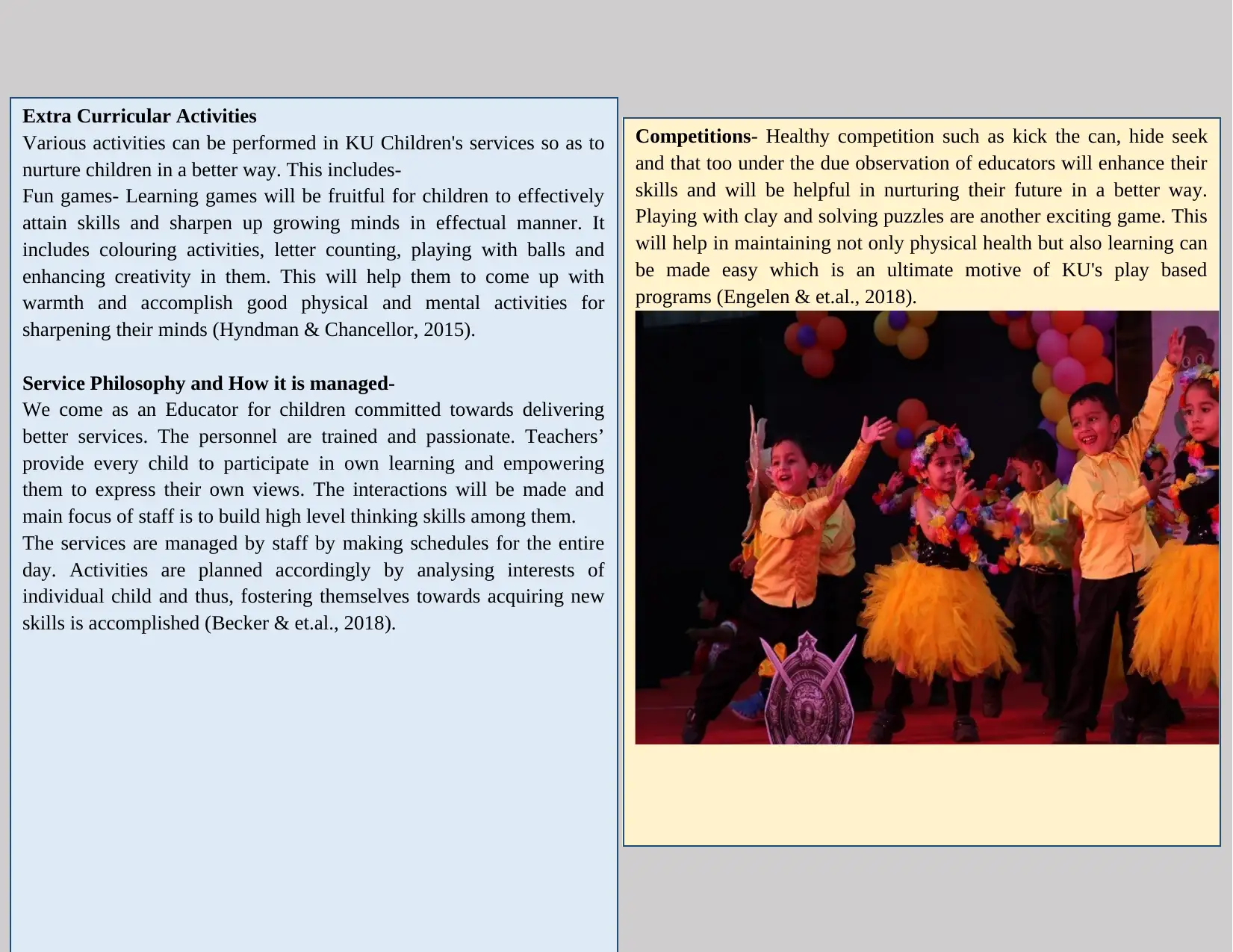
Extra Curricular Activities
Various activities can be performed in KU Children's services so as to
nurture children in a better way. This includes-
Fun games- Learning games will be fruitful for children to effectively
attain skills and sharpen up growing minds in effectual manner. It
includes colouring activities, letter counting, playing with balls and
enhancing creativity in them. This will help them to come up with
warmth and accomplish good physical and mental activities for
sharpening their minds (Hyndman & Chancellor, 2015).
Service Philosophy and How it is managed-
We come as an Educator for children committed towards delivering
better services. The personnel are trained and passionate. Teachers’
provide every child to participate in own learning and empowering
them to express their own views. The interactions will be made and
main focus of staff is to build high level thinking skills among them.
The services are managed by staff by making schedules for the entire
day. Activities are planned accordingly by analysing interests of
individual child and thus, fostering themselves towards acquiring new
skills is accomplished (Becker & et.al., 2018).
Competitions- Healthy competition such as kick the can, hide seek
and that too under the due observation of educators will enhance their
skills and will be helpful in nurturing their future in a better way.
Playing with clay and solving puzzles are another exciting game. This
will help in maintaining not only physical health but also learning can
be made easy which is an ultimate motive of KU's play based
programs (Engelen & et.al., 2018).
Various activities can be performed in KU Children's services so as to
nurture children in a better way. This includes-
Fun games- Learning games will be fruitful for children to effectively
attain skills and sharpen up growing minds in effectual manner. It
includes colouring activities, letter counting, playing with balls and
enhancing creativity in them. This will help them to come up with
warmth and accomplish good physical and mental activities for
sharpening their minds (Hyndman & Chancellor, 2015).
Service Philosophy and How it is managed-
We come as an Educator for children committed towards delivering
better services. The personnel are trained and passionate. Teachers’
provide every child to participate in own learning and empowering
them to express their own views. The interactions will be made and
main focus of staff is to build high level thinking skills among them.
The services are managed by staff by making schedules for the entire
day. Activities are planned accordingly by analysing interests of
individual child and thus, fostering themselves towards acquiring new
skills is accomplished (Becker & et.al., 2018).
Competitions- Healthy competition such as kick the can, hide seek
and that too under the due observation of educators will enhance their
skills and will be helpful in nurturing their future in a better way.
Playing with clay and solving puzzles are another exciting game. This
will help in maintaining not only physical health but also learning can
be made easy which is an ultimate motive of KU's play based
programs (Engelen & et.al., 2018).
⊘ This is a preview!⊘
Do you want full access?
Subscribe today to unlock all pages.

Trusted by 1+ million students worldwide
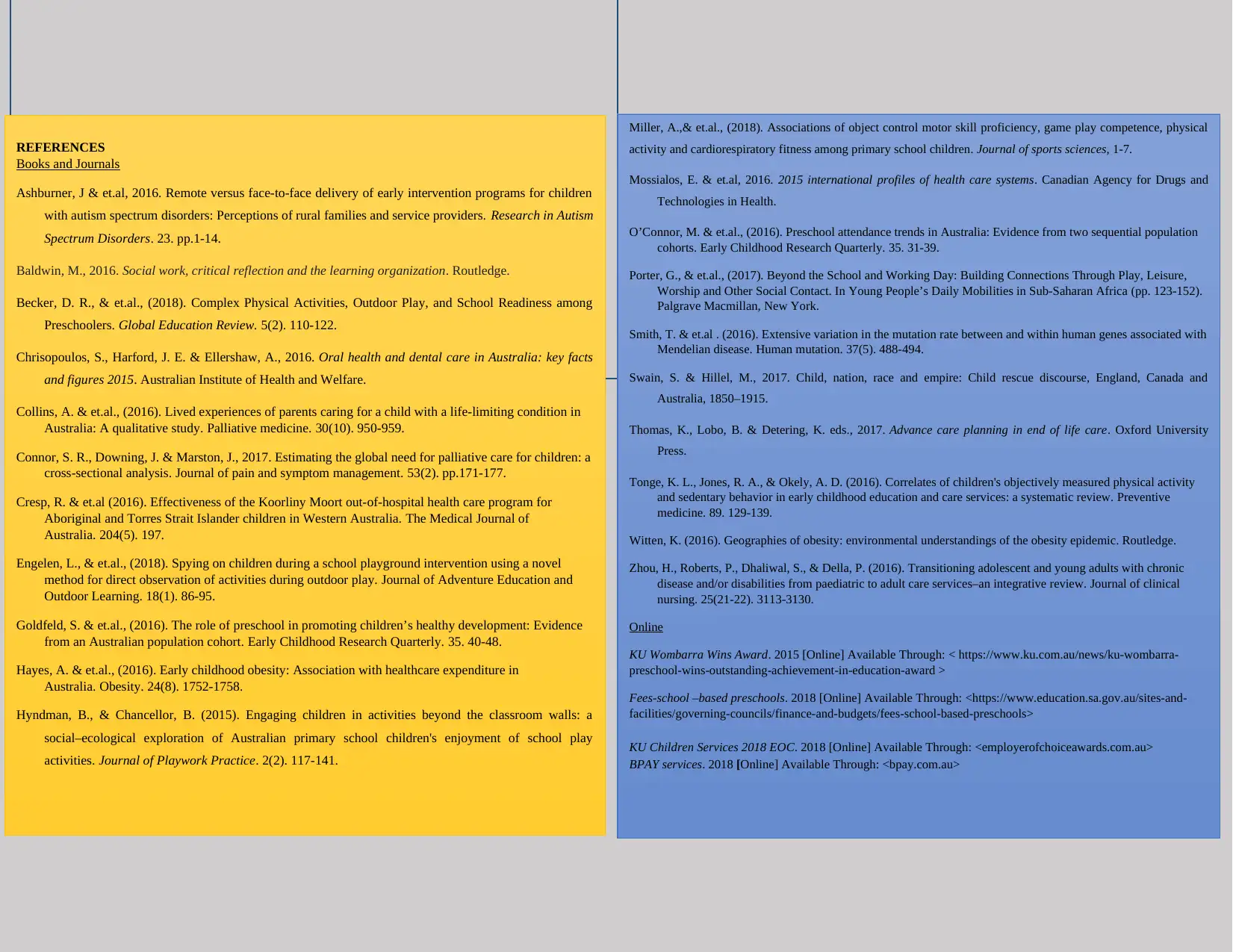
REFERENCES
Books and Journals
Ashburner, J & et.al, 2016. Remote versus face-to-face delivery of early intervention programs for children
with autism spectrum disorders: Perceptions of rural families and service providers. Research in Autism
Spectrum Disorders. 23. pp.1-14.
Baldwin, M., 2016. Social work, critical reflection and the learning organization. Routledge.
Becker, D. R., & et.al., (2018). Complex Physical Activities, Outdoor Play, and School Readiness among
Preschoolers. Global Education Review. 5(2). 110-122.
Chrisopoulos, S., Harford, J. E. & Ellershaw, A., 2016. Oral health and dental care in Australia: key facts
and figures 2015. Australian Institute of Health and Welfare.
Collins, A. & et.al., (2016). Lived experiences of parents caring for a child with a life-limiting condition in
Australia: A qualitative study. Palliative medicine. 30(10). 950-959.
Connor, S. R., Downing, J. & Marston, J., 2017. Estimating the global need for palliative care for children: a
cross-sectional analysis. Journal of pain and symptom management. 53(2). pp.171-177.
Cresp, R. & et.al (2016). Effectiveness of the Koorliny Moort out-of-hospital health care program for
Aboriginal and Torres Strait Islander children in Western Australia. The Medical Journal of
Australia. 204(5). 197.
Engelen, L., & et.al., (2018). Spying on children during a school playground intervention using a novel
method for direct observation of activities during outdoor play. Journal of Adventure Education and
Outdoor Learning. 18(1). 86-95.
Goldfeld, S. & et.al., (2016). The role of preschool in promoting children’s healthy development: Evidence
from an Australian population cohort. Early Childhood Research Quarterly. 35. 40-48.
Hayes, A. & et.al., (2016). Early childhood obesity: Association with healthcare expenditure in
Australia. Obesity. 24(8). 1752-1758.
Hyndman, B., & Chancellor, B. (2015). Engaging children in activities beyond the classroom walls: a
social–ecological exploration of Australian primary school children's enjoyment of school play
activities. Journal of Playwork Practice. 2(2). 117-141.
Miller, A.,& et.al., (2018). Associations of object control motor skill proficiency, game play competence, physical
activity and cardiorespiratory fitness among primary school children. Journal of sports sciences, 1-7.
Mossialos, E. & et.al, 2016. 2015 international profiles of health care systems. Canadian Agency for Drugs and
Technologies in Health.
O’Connor, M. & et.al., (2016). Preschool attendance trends in Australia: Evidence from two sequential population
cohorts. Early Childhood Research Quarterly. 35. 31-39.
Porter, G., & et.al., (2017). Beyond the School and Working Day: Building Connections Through Play, Leisure,
Worship and Other Social Contact. In Young People’s Daily Mobilities in Sub-Saharan Africa (pp. 123-152).
Palgrave Macmillan, New York.
Smith, T. & et.al . (2016). Extensive variation in the mutation rate between and within human genes associated with
Mendelian disease. Human mutation. 37(5). 488-494.
Swain, S. & Hillel, M., 2017. Child, nation, race and empire: Child rescue discourse, England, Canada and
Australia, 1850–1915.
Thomas, K., Lobo, B. & Detering, K. eds., 2017. Advance care planning in end of life care. Oxford University
Press.
Tonge, K. L., Jones, R. A., & Okely, A. D. (2016). Correlates of children's objectively measured physical activity
and sedentary behavior in early childhood education and care services: a systematic review. Preventive
medicine. 89. 129-139.
Witten, K. (2016). Geographies of obesity: environmental understandings of the obesity epidemic. Routledge.
Zhou, H., Roberts, P., Dhaliwal, S., & Della, P. (2016). Transitioning adolescent and young adults with chronic
disease and/or disabilities from paediatric to adult care services–an integrative review. Journal of clinical
nursing. 25(21-22). 3113-3130.
Online
KU Wombarra Wins Award. 2015 [Online] Available Through: < https://www.ku.com.au/news/ku-wombarra-
preschool-wins-outstanding-achievement-in-education-award >
Fees-school –based preschools. 2018 [Online] Available Through: <https://www.education.sa.gov.au/sites-and-
facilities/governing-councils/finance-and-budgets/fees-school-based-preschools>
KU Children Services 2018 EOC. 2018 [Online] Available Through: <employerofchoiceawards.com.au>
BPAY services. 2018 [Online] Available Through: <bpay.com.au>
Books and Journals
Ashburner, J & et.al, 2016. Remote versus face-to-face delivery of early intervention programs for children
with autism spectrum disorders: Perceptions of rural families and service providers. Research in Autism
Spectrum Disorders. 23. pp.1-14.
Baldwin, M., 2016. Social work, critical reflection and the learning organization. Routledge.
Becker, D. R., & et.al., (2018). Complex Physical Activities, Outdoor Play, and School Readiness among
Preschoolers. Global Education Review. 5(2). 110-122.
Chrisopoulos, S., Harford, J. E. & Ellershaw, A., 2016. Oral health and dental care in Australia: key facts
and figures 2015. Australian Institute of Health and Welfare.
Collins, A. & et.al., (2016). Lived experiences of parents caring for a child with a life-limiting condition in
Australia: A qualitative study. Palliative medicine. 30(10). 950-959.
Connor, S. R., Downing, J. & Marston, J., 2017. Estimating the global need for palliative care for children: a
cross-sectional analysis. Journal of pain and symptom management. 53(2). pp.171-177.
Cresp, R. & et.al (2016). Effectiveness of the Koorliny Moort out-of-hospital health care program for
Aboriginal and Torres Strait Islander children in Western Australia. The Medical Journal of
Australia. 204(5). 197.
Engelen, L., & et.al., (2018). Spying on children during a school playground intervention using a novel
method for direct observation of activities during outdoor play. Journal of Adventure Education and
Outdoor Learning. 18(1). 86-95.
Goldfeld, S. & et.al., (2016). The role of preschool in promoting children’s healthy development: Evidence
from an Australian population cohort. Early Childhood Research Quarterly. 35. 40-48.
Hayes, A. & et.al., (2016). Early childhood obesity: Association with healthcare expenditure in
Australia. Obesity. 24(8). 1752-1758.
Hyndman, B., & Chancellor, B. (2015). Engaging children in activities beyond the classroom walls: a
social–ecological exploration of Australian primary school children's enjoyment of school play
activities. Journal of Playwork Practice. 2(2). 117-141.
Miller, A.,& et.al., (2018). Associations of object control motor skill proficiency, game play competence, physical
activity and cardiorespiratory fitness among primary school children. Journal of sports sciences, 1-7.
Mossialos, E. & et.al, 2016. 2015 international profiles of health care systems. Canadian Agency for Drugs and
Technologies in Health.
O’Connor, M. & et.al., (2016). Preschool attendance trends in Australia: Evidence from two sequential population
cohorts. Early Childhood Research Quarterly. 35. 31-39.
Porter, G., & et.al., (2017). Beyond the School and Working Day: Building Connections Through Play, Leisure,
Worship and Other Social Contact. In Young People’s Daily Mobilities in Sub-Saharan Africa (pp. 123-152).
Palgrave Macmillan, New York.
Smith, T. & et.al . (2016). Extensive variation in the mutation rate between and within human genes associated with
Mendelian disease. Human mutation. 37(5). 488-494.
Swain, S. & Hillel, M., 2017. Child, nation, race and empire: Child rescue discourse, England, Canada and
Australia, 1850–1915.
Thomas, K., Lobo, B. & Detering, K. eds., 2017. Advance care planning in end of life care. Oxford University
Press.
Tonge, K. L., Jones, R. A., & Okely, A. D. (2016). Correlates of children's objectively measured physical activity
and sedentary behavior in early childhood education and care services: a systematic review. Preventive
medicine. 89. 129-139.
Witten, K. (2016). Geographies of obesity: environmental understandings of the obesity epidemic. Routledge.
Zhou, H., Roberts, P., Dhaliwal, S., & Della, P. (2016). Transitioning adolescent and young adults with chronic
disease and/or disabilities from paediatric to adult care services–an integrative review. Journal of clinical
nursing. 25(21-22). 3113-3130.
Online
KU Wombarra Wins Award. 2015 [Online] Available Through: < https://www.ku.com.au/news/ku-wombarra-
preschool-wins-outstanding-achievement-in-education-award >
Fees-school –based preschools. 2018 [Online] Available Through: <https://www.education.sa.gov.au/sites-and-
facilities/governing-councils/finance-and-budgets/fees-school-based-preschools>
KU Children Services 2018 EOC. 2018 [Online] Available Through: <employerofchoiceawards.com.au>
BPAY services. 2018 [Online] Available Through: <bpay.com.au>
1 out of 7
Related Documents
Your All-in-One AI-Powered Toolkit for Academic Success.
+13062052269
info@desklib.com
Available 24*7 on WhatsApp / Email
![[object Object]](/_next/static/media/star-bottom.7253800d.svg)
Unlock your academic potential
Copyright © 2020–2025 A2Z Services. All Rights Reserved. Developed and managed by ZUCOL.





